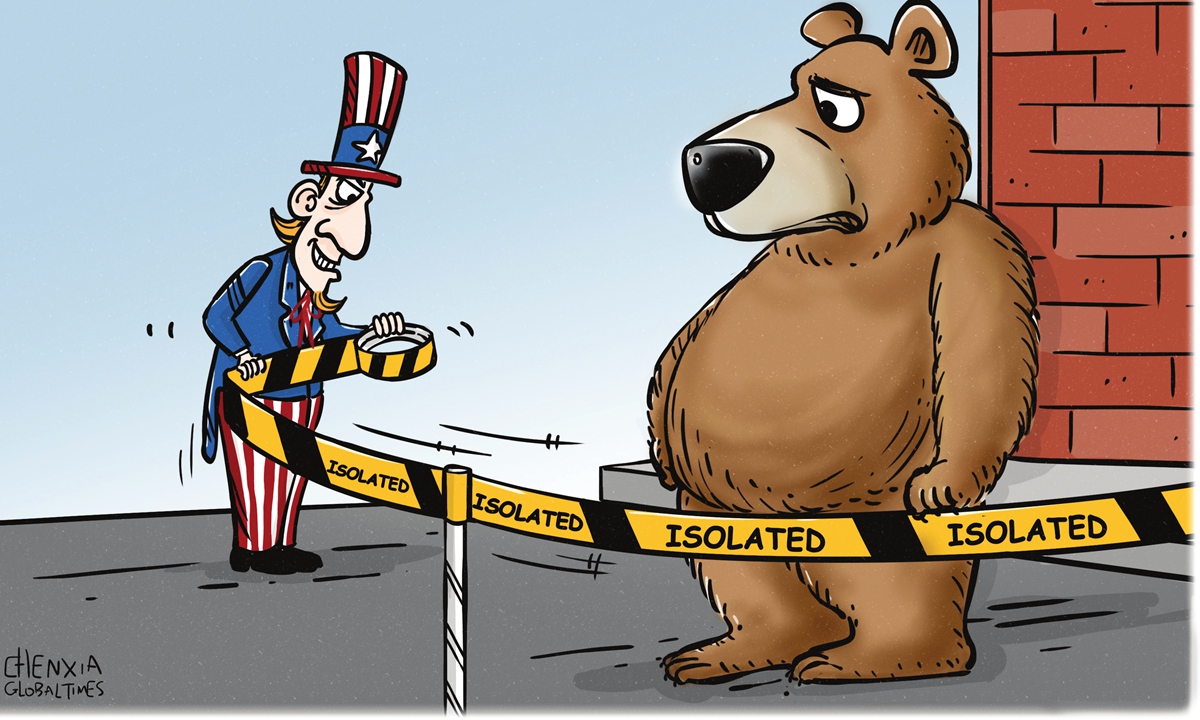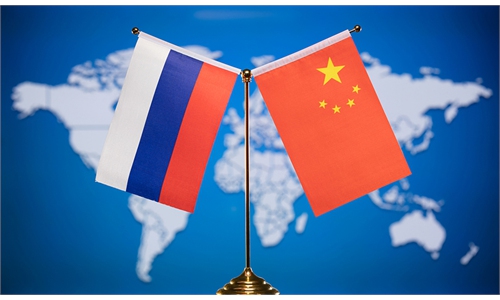US attempt to stigmatize China-Russia strategic security consultation won’t work

Illustration: Chen Xia/Global Times
On September 19, Yang Jiechi, a member of the Political Bureau of the CPC Central Committee and Director of the Office of the Foreign Affairs Commission of the CPC Central Committee, co-chaired the 17th round of the China-Russia Strategic Security Consultation with Secretary of the Security Council of the Russian Federation Nikolai Patrushev in East China's Fujian Province. The two sides agreed to continue to make positive use of the consultation mechanism and enhance mutual trust. They also agreed to support each other in taking the development path in line with their conditions, jointly safeguard global strategic stability, and continuously consolidate and enrich the content of the comprehensive strategic partnership of coordination between the two countries. However, the routine institutional consultations between China and Russia have put the US side on pins and needles, triggering unfounded speculation in Washington.
First, the US has increasingly speculated about the timing of routine strategic communication between Russia and China. In 2005, China and Russia initiated a mechanism of regular strategic security consultations between the two countries, which, in principle, will be held once a year. Due to the impact of the COVID-19 epidemic, the China-Russia strategic security consultation meetings had to be shelved in 2020.
Under the mechanism, China and Russia communicate each other's strategic security, military-security cooperation, global strategic stability, regional peace and development strategies, as well as other important issues, and strategically coordinate on issues involving each other's core interests and major concerns.
The timing of this year's China-Russia strategic security consultation has aroused great concern from the US side. Just four days ago, the heads of state of China and Russia held bilateral talks during the Shanghai Cooperation Organisation (SCO) summit and exchanged views on bilateral relations and the current international situation. During this strategic security consultation, Yang and Patrushev announced that they will implement the consensus reached by the heads of state of China and Russia during the SCO Samarkand Summit, and always firmly support each other on issues concerning each other's core interests and major concerns.
However, the US has since pushed misinformation that at the SCO summit, China and Russia may have reached a consensus on "jointly confronting NATO" or "confronting the West, " and the strategic security consultation, which took place right after the SCO summit, was thus aimed to make specific strategic arrangements to implement the "consensus."
Second, the US has frequently hyped about the venue where China and Russia conducted the consultation. Yang hosted Patrushev in Nanping, Fujian Province, the former's hometown, which was a way to show hospitality. But the US media speculated that the choice of Nanping, which is only a few hundred kilometers away from the island of Taiwan, aimed at indicating Russia's firm support of China on the Taiwan question. Just one day prior to the consultation, US President Joe Biden in a CBS 60 Minutes interview said US forces would defend Taiwan in the event of an invasion from the mainland. On the day of the China-Russia consultation, Air Force Gen. Anthony Cotton told the Senate Armed Services Committee, "at the end of the day, Russia and China both understand that we have a strong, resilient nuclear force that is offering deterrence to ourselves and extended deterrence to our enemies."
Third, ever since the establishment of the China-Russia strategic partnership in 1996, the US has tried every possible means to undermine China-Russia relations. It first played down the relationship and claimed that it is "a matter of expediency." As strategic coordination reaches new heights, the US has tried to drive a wedge between the two. After the bilateral strategic coordination withstood the test of the US strategic adjustment after 9/11, the West's smear of China in the backdrop of the COVID-19 pandemic, and the Ukraine crisis, the US once again chose to stigmatize China-Russia relations, saying that their strategic coordination is an axis of anti-West alliance. On the issue of the Russia-Ukraine conflict, the US has kept hyping that China was informed of Russia's plan in advance, that China and Russia colluded, and that China sent military assistance to Russia and weakened Western sanctions against Russia. This time, as China and Russia held security consultation, the US has again hyped that Russia may ask China to provide weapons to speed up the pace of advancement in Ukraine.
The China-Russia strategic partnership of coordination has its own development logic and rhythm. Whether Washington is dismantling or stigmatizing it, it is difficult to prevent the in-depth development of the relationship between the two countries. The core essence of China-Russia relations is non-alignment, non-confrontation, and non-targeting third parties. Both China and Russia have no intention of building what the US calls an "anti-Western alliance," but follow a new security concept that is worlds apart from the Cold War mentality that Western countries cling to.
The author is the deputy dean of the Russian Institute of Tsinghua University. opinion@globaltimes.com.cn



